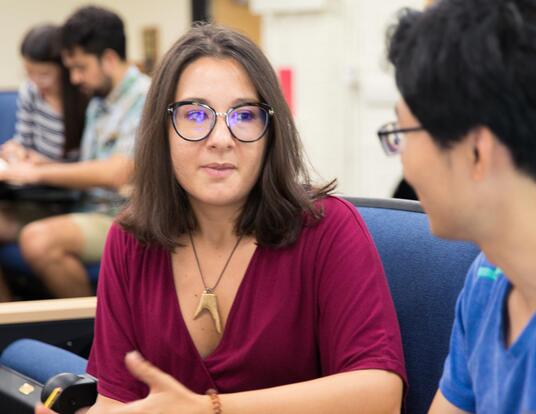Modeling Pedagogical Agility: The 2022 Derek C. Bok Awards
Graduate students recognized for outstanding teaching
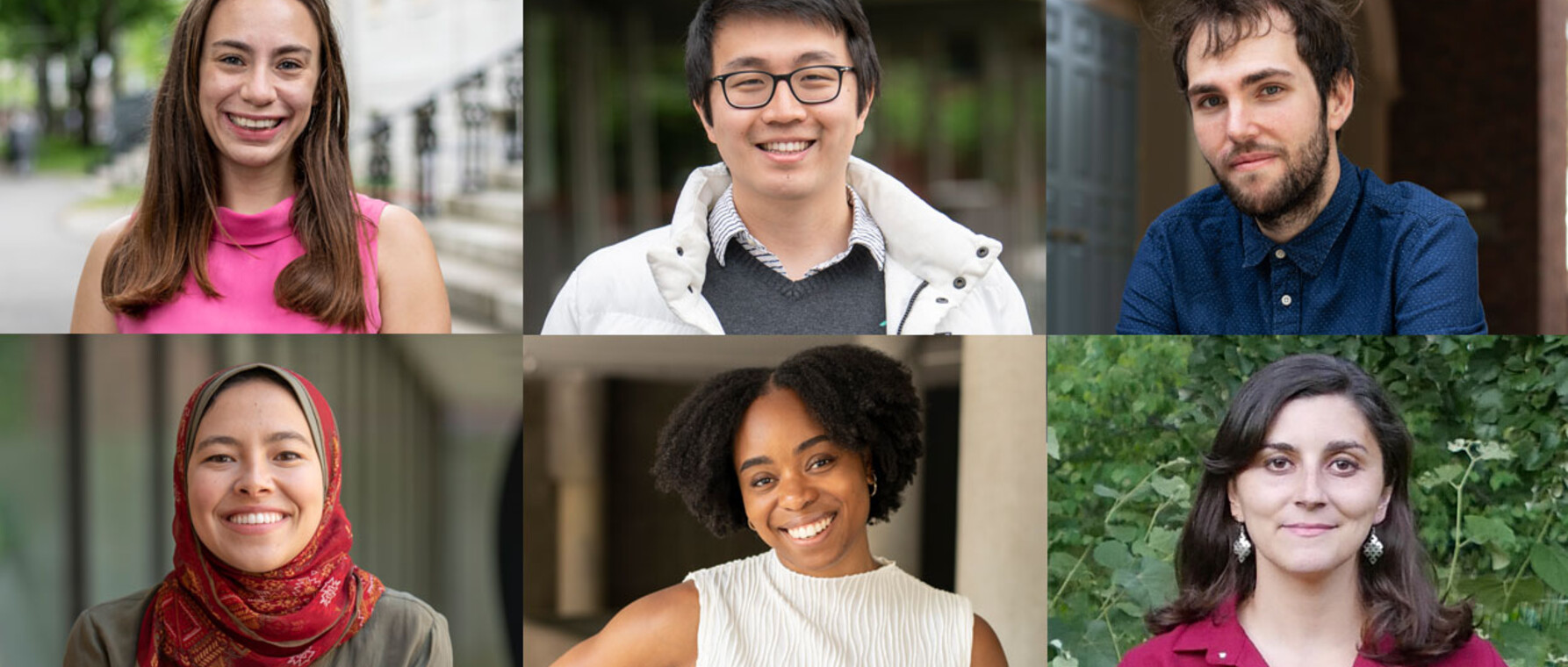
In some ways, year two of the global COVID-19 pandemic was even more challenging for Harvard’s graduate student teaching fellows (TFs) than year one. Undergraduates came back to campus apprehensive but hopeful for a return to normal—or as normal as college can be with masking requirements and weekly testing. Then, just as they were settling into a routine, students were wrenched back into full pandemic living—and learning—thanks to new variants and a winter surge in infections.
The six recipients of last spring’s Derek C. Bok Award for Excellence in Graduate Student Teaching of Undergraduates exemplify the commitment and pedagogical agility demanded of teaching fellows during the 2021-2022 academic year. They created a supportive environment where students learned not only the subject matter, but also how to think and write like scholars. They passed along their own passion and curiosity, inspiring undergraduates to look beyond the boundaries of course requirements. And, throughout the push and pull of another pandemic year, they responded to their students’ needs with care and compassion.
For their remarkable skill and devotion, the winners of the 2022 Bok Awards—made possible thanks to an endowment established by David G. Nathan ’51, MD ’55, the Robert A. Stranahan Distinguished Professor of Pediatrics at Harvard Medical School, and his wife Jean Louise Friedman—received a $1,000 prize and a certificate bearing the citations below.
Chelsea Boccagno:
Giving Students Support to Be Their Best
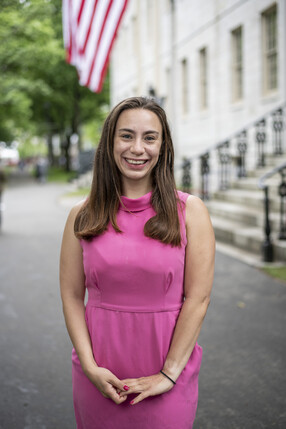
Consistently demonstrating excellence, with unrivaled skill, commitment, and enthusiasm, Chelsea Boccagno has accumulated an impressive teaching record during her time at Harvard. What distinguishes the PhD student in psychology from her peers is the depth and breadth of her teaching and mentoring experiences, which extend well beyond the traditional role of a teaching fellow, and how universally successful she has been.
For the past two years, Boccagno has led the Department of Psychology’s sophomore tutorial courses, PSY 971 (general psychology version) and PSY 975 (neuroscience version). In these small weekly seminars, undergraduates are taught how to read, write, and think like psychological scientists. While the department provides guidance on policies and assignments, the design of the course—as well as the selection of readings, lesson plans, activities, grading, and feedback—are the responsibility of the tutor, of whom the intensive class demands a tremendous investment of time and energy.
“It is incredibly rare for a graduate student to elect to hold this position for two full years, and something we see only from students like Chelsea who demonstrate an unwavering commitment to educating undergraduates and truly enjoy these roles,” says Professor Leah Somerville. “It is also rare for graduate students to teach both the psychology and neuroscience versions of the tutorial, which requires a deep and flexible base of knowledge and pedagogical skills.”
Beloved by her students, Boccagno is also respected by her peers for the thoughtful advice on fostering a supportive seminar atmosphere and setting clear boundaries in group meetings. Her excellence resulted in a Q instructor rating of 5/5 for PSY 975. “Chelsea was an amazing section leader,” one student wrote in a course evaluation. “She provided extremely thorough and helpful feedback on every assignment which helped my writing to improve throughout the course.” Another commented: “Chelsea…made a great atmosphere for discussion without making anyone feel judged.”
Alexandra Dennett:
An Expert Guide to Artistic Innovation—and Colonization

Bringing energy, empathy, generosity, dedication, knowledge, and, above all, an extraordinary quality of mind, Alexandra Dennett excelled as a teaching fellow for the course “Manet to Man Ray: Modern Art and Its Colonial Matrix.” New for fall 2021, the course involved a comprehensive reconceptualization of the history of modern art between 1860-1940 in terms of the European quest for empire. “It represented a rigorous attempt to decolonize our primary field of study,” says Maria Gough, Joseph Pulitzer Jr., Professor of Modern Art. “With Alexandra’s expert guidance, the students studied how modernist innovation was shaped by the violence of imperial expansion, and the domination of colonized peoples.”
Dennett served as the sole TF for the class, leading two sections of 22 undergraduates, and received outstanding feedback. “Alexandra was one of the best teaching fellows I’ve had in my time at Harvard,” one student wrote. “In section, we had really engaged and thought-provoking back–and–forths. I especially appreciated how we would delve into the primary sources in section, which there usually wasn’t time for in lecture.” Another commented, “she added an important dimension to class by providing a warm and inviting space where we could reflect on the lectures and continue our discussion of the selected artworks for that week.”
In addition to teaching sections, Dennett dedicated a great deal of time to individual consultations with each undergraduate as they developed exhibition proposals that grappled with the difficult issues under discussion. It was not just in the execution of the course, however, that Dennett played a fundamental role; she fully participated in the planning stage.
“Prior to the start of the semester, she and I debated at length the many complex—not to mention profoundly controversial—issues raised by its proposed historical and geographical breadth,” says Gough. “In order to prepare the syllabus, we reviewed a slew of readings together, studied available museum collections to facilitate in-person visits for students, and brainstormed new forms of assessment. All of this, even before the semester began.”
Joshua Linkous:
Inspiring Students to Look Beyond the Syllabus
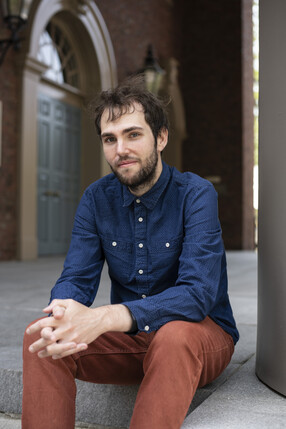
A self-identified teacher-scholar, Joshua Linkous is known and loved by undergraduates for his high expectations and for encouraging discussion and debate in the classroom. The PhD student in history and East Asian languages served as a teaching fellow (TF) for the intensive undergraduate seminar “The History of Energy” and continually impressed his advisor, Professor of History Ian Miller.
The course itself is demanding. Reading loads are heavier than they are in most classes. Discussions deal with the hot-button issues of climate change and capitalism, often becoming contentious. Peer review and feedback are woven into the syllabus. This year, the course was over-enrolled because the shopping group was so large but still succeeded, according to Miller, because of Linkous. “He acted as a co-instructor at times,” Miller says, “and he pushed me to be clearer in my engagements.” He also inspired students to pursue additional research work by asking them interesting questions. His mentoring work in the class was so good that the Department of History received requests to pursue independent study courses under his tutelage, notable in a department where students normally seek faculty guidance.
Linkous’s commitment to students of “The History of Energy” was remarkable, even among teaching fellows who have won Bok Center recognition in the past. Whether meeting them for dinner in the undergraduate houses or speaking with them on Zoom about shared academic passions, Linkous takes great pleasure in the time he spends with students. So do they, largely because the TF is a good listener who, despite his brilliance, keeps his mind open to perspectives and ideas different than his own.
In addition to his outstanding work as a teacher and mentor, Linkous aided students in crisis during the pandemic, connecting them with CAMHS when they were struggling, bringing their needs to resident deans; and encouraging students to put their ideals into practice. “He has emerged as a talented teacher and mentor,” says Miller. “I am proud to advise him.”
Sarah Mohamed:
Collegial and Compassionate

“Sarah Mohamed cares deeply about teaching and works hard at it,” Professor Steve Levitsky says of the PhD student in government, who served as a teaching fellow for his class, “Introduction to Comparative Politics.” A gifted and energetic teacher, Mohamed provides invaluable leadership both in the classroom and to the Department of Government community.
“Introduction to Comparative Politics” had more than 200 students, most of whom were in their first or second year at the College. Because the course took place in fall 2021, many faced significant challenges in adjusting to campus life and the University’s COVID-19 restrictions. Levitsky credits Mohamed with helping these students get through the course and the semester. “Grades for Sarah’s students were higher than those in other sections—not because Sarah inflated grades but because her students knew the material and wrote good essays.”
Mohamed’s commitment to her students goes above and beyond the classroom. When an undergraduate in the class “Authoritarianism” contacted her with a COVID-related concern, Mohamed, who was with her family at the time, immediately reached out to reassure the student and updated the course leader, Lecturer Sarah Hummel. “She interrupted time with her family to check in about the student, she knew exactly how that student was faring in the class without needing to look it up,” says Hummel. “Perhaps most importantly, her immediate response was one of compassion. That goes a long way with students and helps explain how she was able to foster such a supportive environment, despite teaching remotely.”
Mohamed also served as head TF for “Introduction to Comparative Politics,” creating an environment in which civility and collegiality prevailed among the course’s eight teaching fellows. “The TFs were all excellent, but they held very different views about expectations, discipline, and grading standards,” says Levitsky. “It was very important that we apply broadly similar standards across sections, and Sarah played a major leadership role in forging consensus.”
Mohamed’s excellence and compassion are best summed up by one undergraduate’s course feedback. “Sarah really cares about her students and worked so hard to help us understand the material,” the student wrote. “She was always so accessible and willing to talk, which was amazing because this Zoom semester was very lonely.”
Udodiri Okwandu:
The Saving Grace
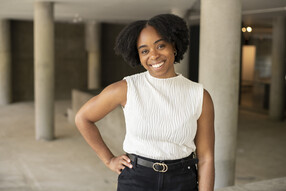
Praised as a “superstar teacher”, Udodiri Okwandu has distinguished herself as an outstanding educator as well as a scholar in the Department of the History of Science, where she is a PhD student.
“Her evaluations—a 5.0 from 15 students—speak for themselves,” says Professor David Jones, who supervised Okwandu as head teaching fellow in his course “Medical Ethics and History.” “Head TFs often get lower evaluations, as they have to have a different relationship with students, but not in this case.” In addition to working with Okwandu during the term, Jones collaborated with her in updating the course syllabus in light of COVID-19 and the Black Lives Matter movement. “She did a terrific job finding sources and authors that diversified the syllabus,” he says.
Masterfully guiding conversations in her sections, Okwandu created a welcoming environment in which all students could feel comfortable sharing their personal experiences. She remained positive when discussions intensified, responding thoughtfully to student comments and adding valuable insights on course material.
The uniformly enthusiastic feedback from students in both courses Okwandu taught distinguished her from other TFs. “Udodiri was the saving grace of this class,” wrote one undergraduate. “Extremely engaging and kind, she is truly amazing to be around and generated so much enthusiasm for the material in a time where school is just not very engaging.”
Okwandu’s kindness, understanding, and warmth made students feel less like they were in an academic setting and more like they were having a discussion among friends about serious topics. “Udo perfectly spotlighted the most fascinating and compelling moments from the lectures and readings and made sure we got as much from section as possible and left with even more to think about,” one student wrote. “She’s a treasure!
Josh Wang:
Lighting the Fire of Student Curiosity
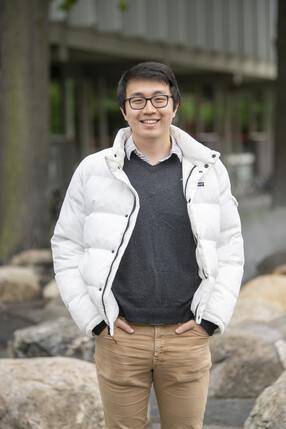
Known as a dedicated, attentive, caring instructor who shares his passion for mathematics with undergraduates at all levels, Josh Wang brings a dynamic energy to his teaching that makes class stimulating, engaging and fun. During one class, the PhD student in mathematics touched on his research into topology, which so impressed one student that she stayed afterward to learn more. “Josh was able to communicate his fascination with the subject, lighting the student’s curiosity on fire,” says Preceptor in Mathematics Brendan Kelly.
Graduate students in the department have many different options to fulfill their teaching responsibilities. One of the most ambitious projects they can take on is organizing an undergraduate tutorial. Wang has organized three that intersect in different ways with his interest in low-dimensional topology. Students appreciate his well-crafted mathematical narratives. “From the beginning to the end, the tutorial was a professional, serious, well-organized academic experience,” one student wrote. “It was clear that Josh put a great deal of thought into the topics of the course and how to best present challenging ideas and techniques in algebraic topology to undergraduates.”
In fall 2020, Wang responded on short notice to a request to teach a calculus class, demonstrating his dedication to the educational mission of his department. Students overwhelmingly praised him and his talent as an instructor. “You can tell how much work Josh put in to teach us effectively,” one undergraduate wrote. “I didn’t realize until the couple days that he was absent how much of an effect that he had on our learning experience.”
Several years ago, Wang extended his influence in undergraduate education beyond the classroom when he and several other students created the Directed Reading Program (DRP), which pairs undergraduates with graduate students for term-long projects and mentoring. Wang not only helped to shape the program but also successfully mentored five projects and wrote a guide for new graduate students. He continues to help match the graduate student mentors with undergraduates each term. “He is always thoughtful and careful in building these mentoring pairs,” says Kelly. “Josh’s efforts with the DRP will be felt in the department for many years to come.”
Photos by Tony Rinaldo
Get the Latest Updates
Join Our Newsletter
Subscribe to Colloquy Podcast
Simplecast





